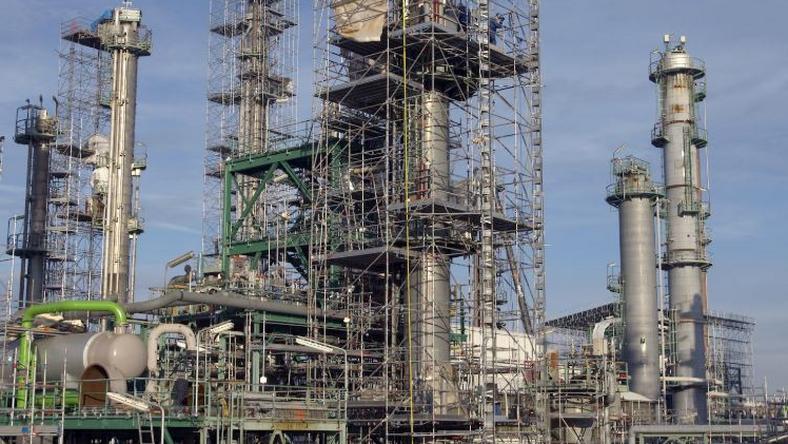
… Production unlikely till 2025
All is not well with Dangote Refinery as every indication suggests that the commencement date for its production may no longer be feasible as a result of multitude of challenges confronting the Africa’s biggest oil refinery.
Sources according to pointblanknews.com have it that Dangote Oil Refinery may run into a deep financial crisis from rapidly increasing interests amounting to millions of dollars as a result of its inability to commence production.
Industry watchers are of the opinion that a possible takeover of the project by the Assets Management Corporation of Nigeria (AMCON) is imminent as Dangote management has been unable to meet up with the servicing of the mounting debts.
Dangote Oil Refinery, a 650,000 barrels per day (BPD) integrated refinery project under construction in the Lekki Free Zone, Lagos, Nigeria, was expected to commence production in 2016 with $3.3billion financing secured in 2013.
With the refinery now projected to commence operations in 2025, Dangote Group’s indebtedness to the financial institutions is estimated to hit $8.4billion by 2025. Presently, this debt burden has risen to 7billion dollars with debt servicing of almost 700million dollars per annum.
The completion date of the refinery had been moved eight times. Whilst some might say this is not in the character for Dangote Industries and their numerous projects across different sectors, the problem is deeply rooted.
A contractor at the delayed refinery project, speaking under the condition of anonymity, said that poor planning, underpayment of contractors, and a lack of proper project management with over 40 contractors on site has led to most of the delays. He also added that of the 40, none is willing to commission as there is no clear delegation of duty and over-decentralization leading to absolute chaos.
With these incessant delays, some financing banks are already calling in their loans amid fears of liquidity crisis, while others are elated by the guarantee of huge interests to be recouped as soon as the refinery comes on stream.
According mmsplus.com, an online newspaper, Dangote has been able to restructure the facilities from various local and international banks twice so far, most banks have totally refused to restructure for the third time with principal repayment also falling due as well as the annual interest payments.
The Nigerian National Petroleum Corporation (NNPC) has made available $3.8billion as part of federal government’s 20% equity in the project, providing $1billion cash, while the remaining $2.8billion will be in crude supply.
However, analysts have pointed out that NNPC’s 20% equity at $3.8billion makes the Dangote refinery overvalued at $19billion.
When Aliko Dangote unveiled early plans for the refinery in September 2013 and announced that he had secured about $3.3 billion in financing for the project, the refinery was estimated to cost about $9 billion, of which $3 billion would be invested by the Dangote Group and the remainder via commercial loans, and begin production in 2016.
However, after a change in location to Lekki, construction of the refinery did not begin until 2016 with excavation and infrastructure preparation, and the planned completion was pushed back to late 2018.
In July 2017, major structural construction began, and Dangote estimated that the refinery would be mechanically complete in late 2019 and commissioned in early 2020. Experts, however, posit that the construction would likely take at least twice as long as Dangote publicly stated, with refining capability not likely to be achieved until 2025.
Meanwhile, last week the Minister of State for Petroleum Resources, Timipre Sylva, reiterated that Federal Executive Council (FEC) approved the acquisition of 20 per cent minority stakes by the NNPC in the Dangote Petroleum and Petro-Chemical Refinery.
Sylva, while briefing State House correspondents after the virtual FEC meeting presided by Vice President Yemi Osinbajo on Wednesday at the Presidential Villa, said that the acquisition was in the sum of $2.76 billion.
“The Executive Council also approved the acquisition of 20 percent minority stakes by the NNPC in the Dangote Petroleum and Petro-Chemical Refineries in the sum of $2.76 billion,” he said.
This development has been described by industry observers as strange because $2.76 billion falls short of 20 percent of the Dangote project valued by the sponsor at $16 billion. Using the $16billion value, 20 percent should be $3.2billion and analysts have expressed dissatisfaction at the disparity in the project’s value and NNPC’s funding.
Speaking on the complexities with funding Dangote refinery, the Managing Director of Cowry Assets Management, Mr. Johnson Chukwu argued that the banks wouldn’t have any challenge from the financing because Dangote would have to pay the interests.
“I don’t see the banks being unable to meet their liquidity because of the monies tied down in the Dangote refinery. Ultimately, if the investment is economically viable, when it starts operation it should be able to meet up the arrears. I believe the banks that went into this project understood some of these constraints and didn’t break their balance-sheets in the move to finance Dangote refinery. I don’t envisage any bank having a liquidity challenge as a result of investing in Dangote refinery. If there is any challenge it would come from Dangote, but it should be resolved when the project takes off,” he said.
Commenting on the possibility that NNPC over-valued or under-valued the project in its 20% equity, Chukwu opined that NNPC may be looking at an enterprise valuation while the other value could be the net value.
“The enterprise value could be higher than the amount Dangote has invested in the project. However, I wasn’t involved in determining that, so anything I say will be purely speculative,” he said.
Despite the massive support of the federal government on the refinery project, things have gotten so bad for the billionaire that even income from his other businesses may not be enough to cover the interest rates, talk less of the principal.
The $8.4billion debt represents 75% of Dangote’s net worth at $11.1billion and Africa’s richest man has to seek innovative ways to prop up his business now as the refinery project continues to be consistently delayed.
In a related development, Nigeria’s controversial PIB Amendment and the crude swap saga has been described by industry observers as another attempt by the federal government to give a monopoly of importation for petroleum products into the country to Messrs Dangote.
Is this a ploy to ensure Dangote can make the excessive and extra profits he needs to manage his rising debt profile for the refinery under the guise of ongoing refinery projects? Nigerians will bear the brunt of the higher costs in petroleum products at a time when subsidies are reduced, analysts posit.
Meanwhile, in a bid to address the flaws in the PIB, Major Oil Marketers Association of Nigeria (MOMAN) and Depot and Petroleum Products Marketers Association of Nigeria (DAPPMAN) have noted some downstream observations and recommendations for the Senate and House Committee reports on the PIB.
A copy of this report obtained last week, pushed for the deletion of some clauses in the PIB such as; Clause 317 (8), (1-3)The Authority shall apply the Backward Integration Policy in the downstream petroleum sector to encourage investment in local refining. To support this, license to import any product shortfalls shall be assigned only to companies with active local refining licenses and Import volume to be allocated between participants based on their respective production in the preceding quarter.
Commenting on this, the groups noted that a licensing regime for importation be included in section 174 and the conditions for licensing be open and transparent, ensuring free market competition and a level playing field for all parties to enhance market efficiencies.
The groups also highlighted Clause 317 (8)(4) “Such import to be done under NNPC Limited Direct Sale/Direct Purchase (DSDP) scheme” as a provision that should be deleted as it will destroy the private businesses that currently supply the market (through importation) diesel, Aviation fuel, Kerosene, Base oil, LPG etc, adding that the job and taxation losses will be huge.
Meanwhile, Clause 317 (8) (5) “To safeguard the health of Nigerians, imported petroleum products shall conform to the Afri-5 specification (50ppm sulphur) as per the ECOWAS declaration of February, 2020 on adoption of the Afri- Fuels Roadmap” was also recommended to be deleted because technical specification for products are better not hardwired in legislation, should be done through regulation by the Authority.
“A holder of a license or permit shall not, without the prior written consent of the Authority, assign or transfer its License or Permit or any right or obligation arising from the license or permit,” on Clause 117 (1) was also recommended to be expunged as it would amount to over-regulation of the downstream. This was a provision carried forward from the upstream due to its nature and implications for national security.
Other parts of Clause 117 from 2-7 were highlighted for deletion; (2)An application for assignment or transfer of a license or permit shall be made to the Authority, which may require the applicant to publish a notice of the application in the form, manner and time prescribed by regulation under this Act. (3)The Authority shall, in the determination of whether a license or permit is to be assigned or transferred, (a) follow the same procedure with appropriate modifications; (b) apply the same rules and criteria; (c) consider the same issues as if the party to whom the License or Permit is being assigned or transferred is applying for a new License; and (d) consider the representations made to it by third parties in respect of the application.
On the aspect that the Authority shall, subject to subsection (3) of this section, communicate in writing, its approval or refusal of an application for assignment or transfer of a license or permit within the time prescribed by regulation under this Act. (5)Where the Authority does not approve or refuse an application and fails to communicate its decision to an applicant for the assignment or transfer of a license or permit within the prescribed time, the application shall be deemed to be approved.
Where the Authority refuses the grant of an application for an assignment or a transfer of a license or permit, it shall communicate to the applicant the reason for the refusal and shall give reasonable time within which further representation may be made by the applicant or by a third party in respect of the application. (7) Where the Authority grant consent to an assignment or transfer of a license or permit, it shall notify the applicant in writing, subject to any condition it may consider appropriate.



